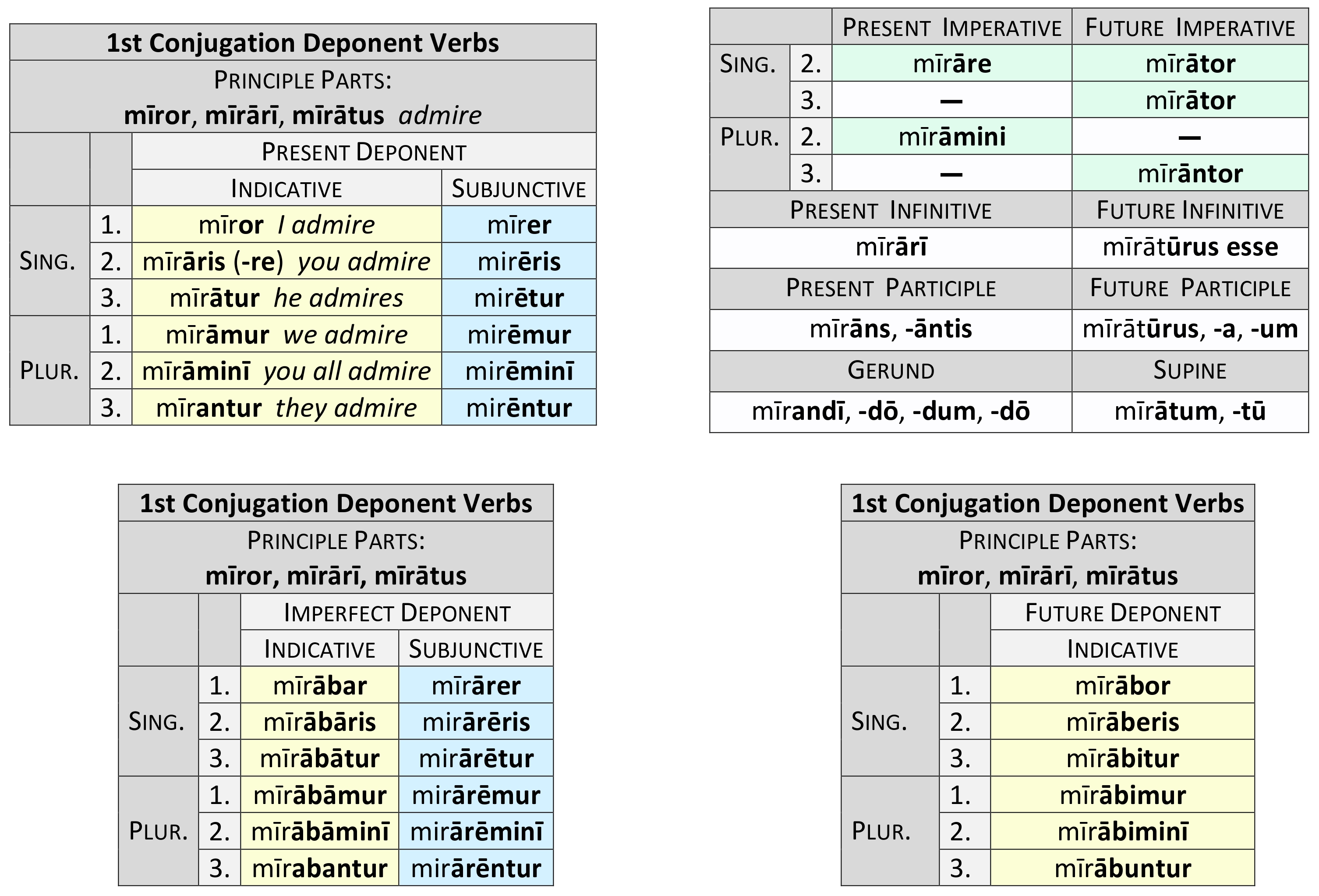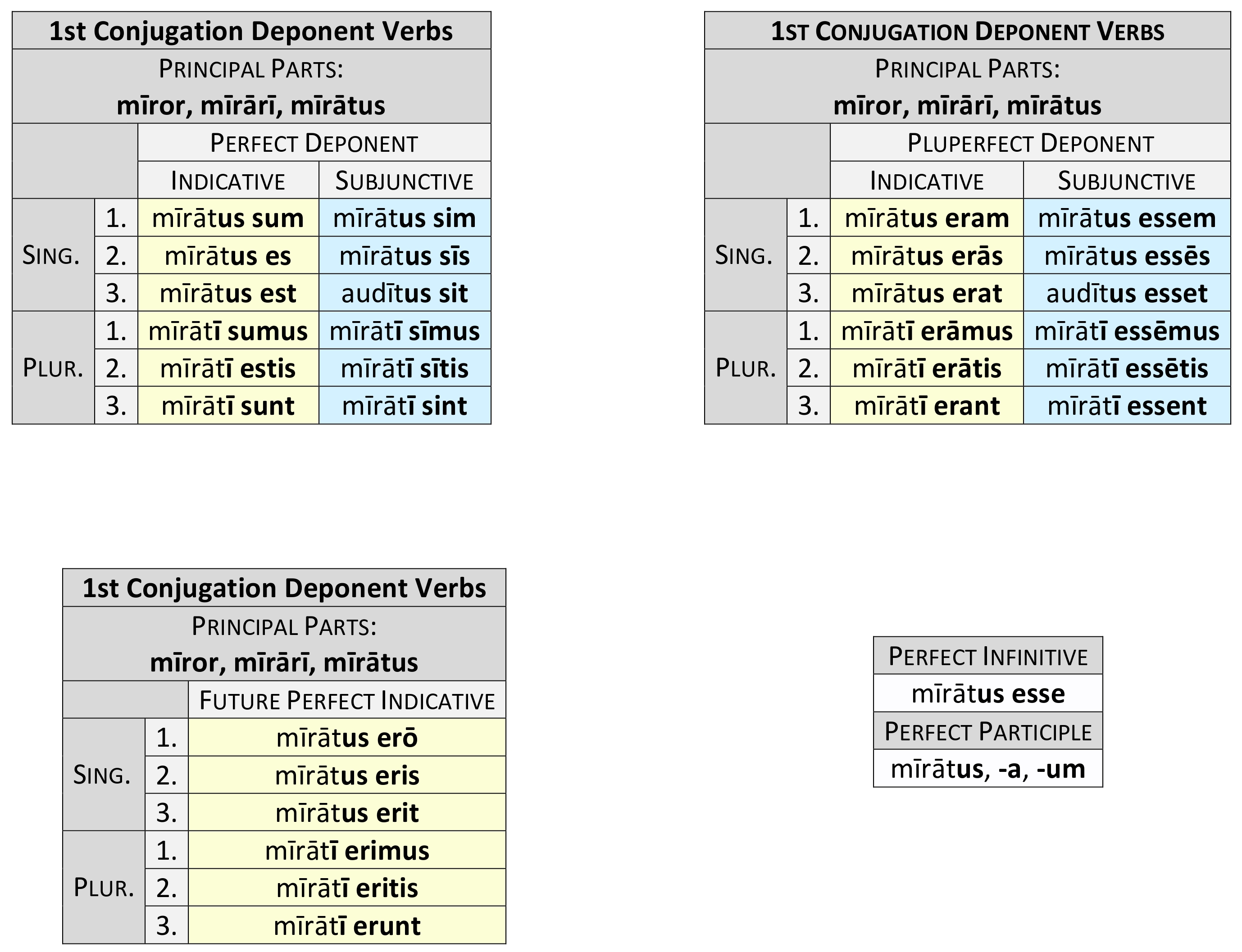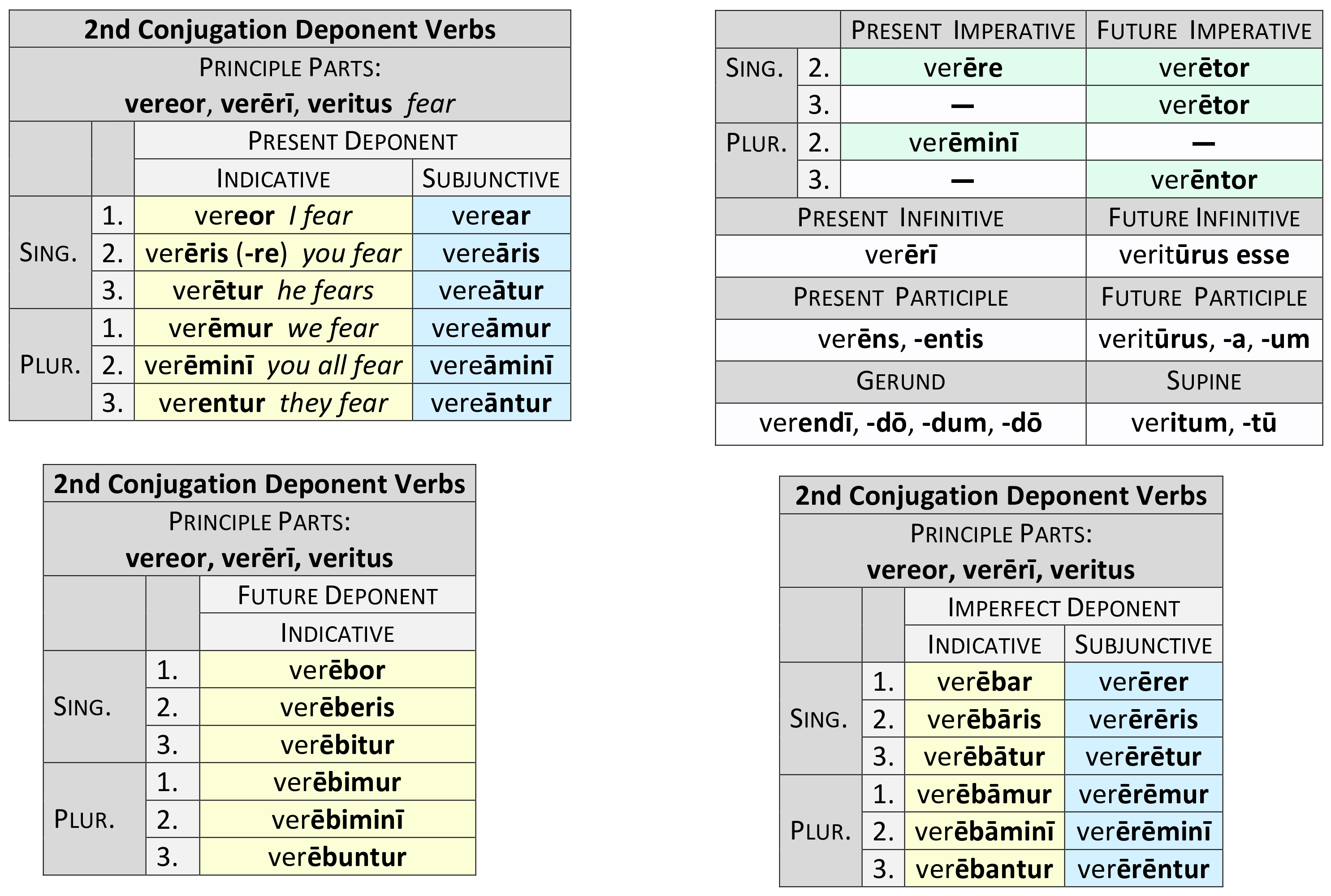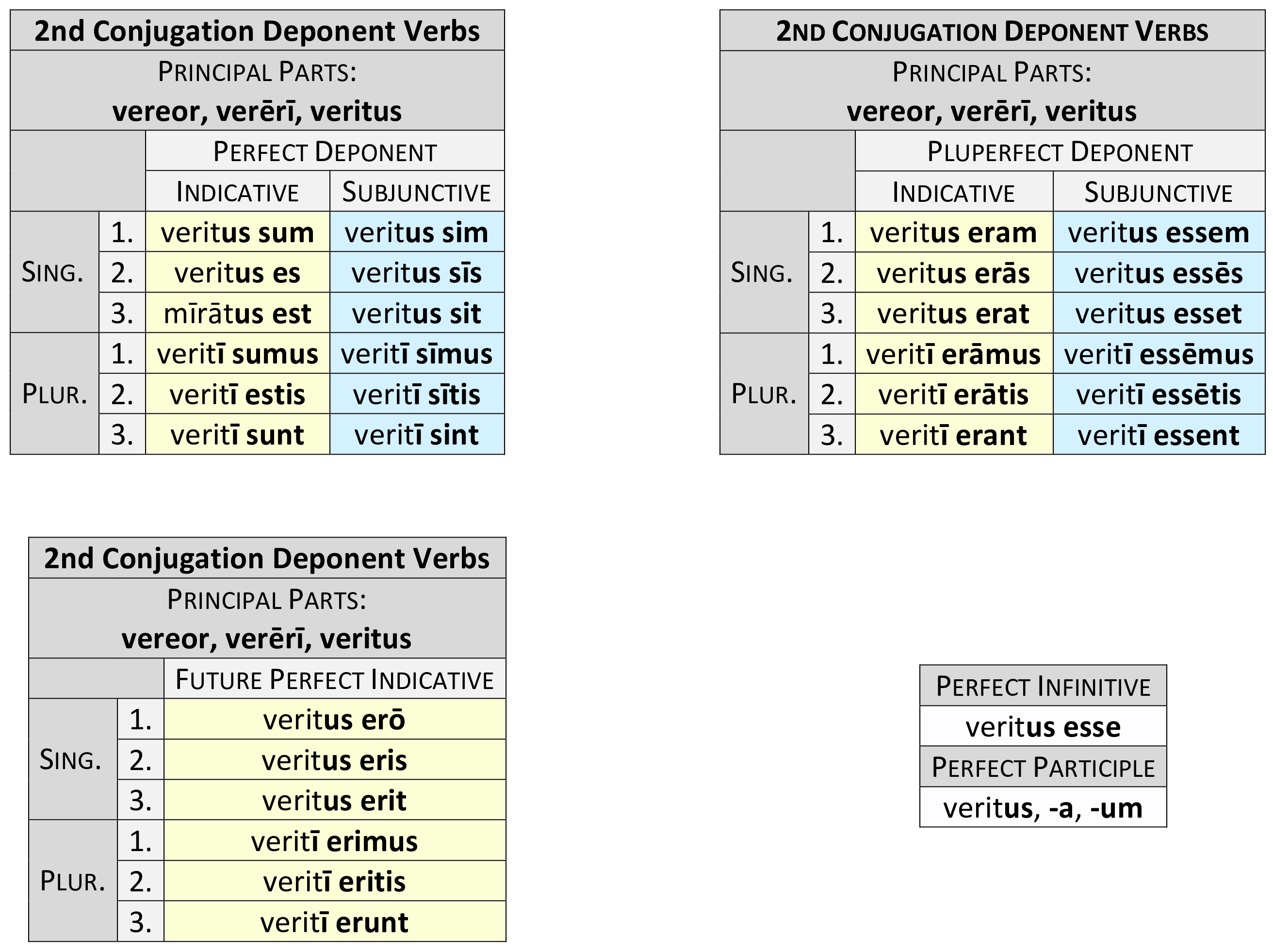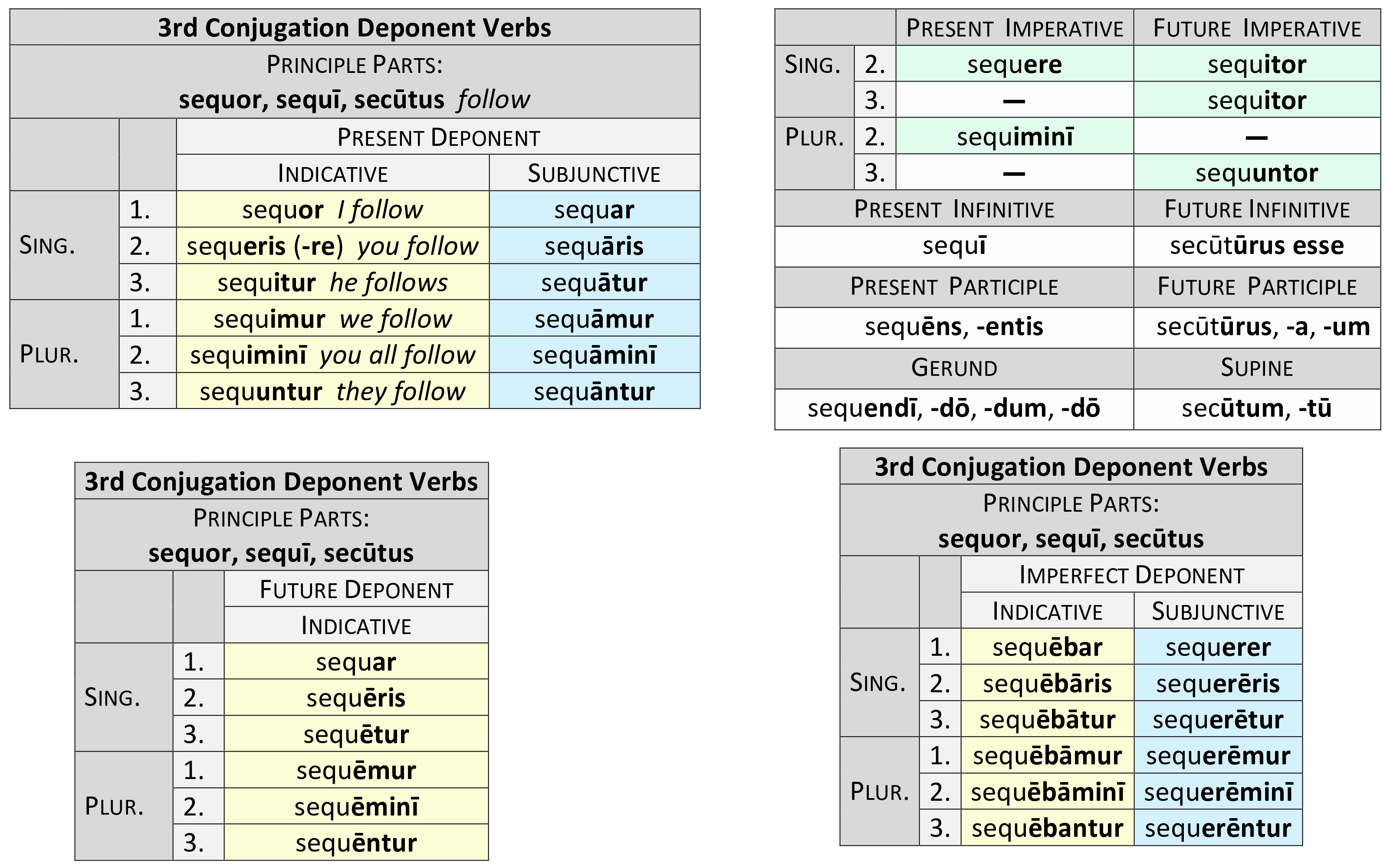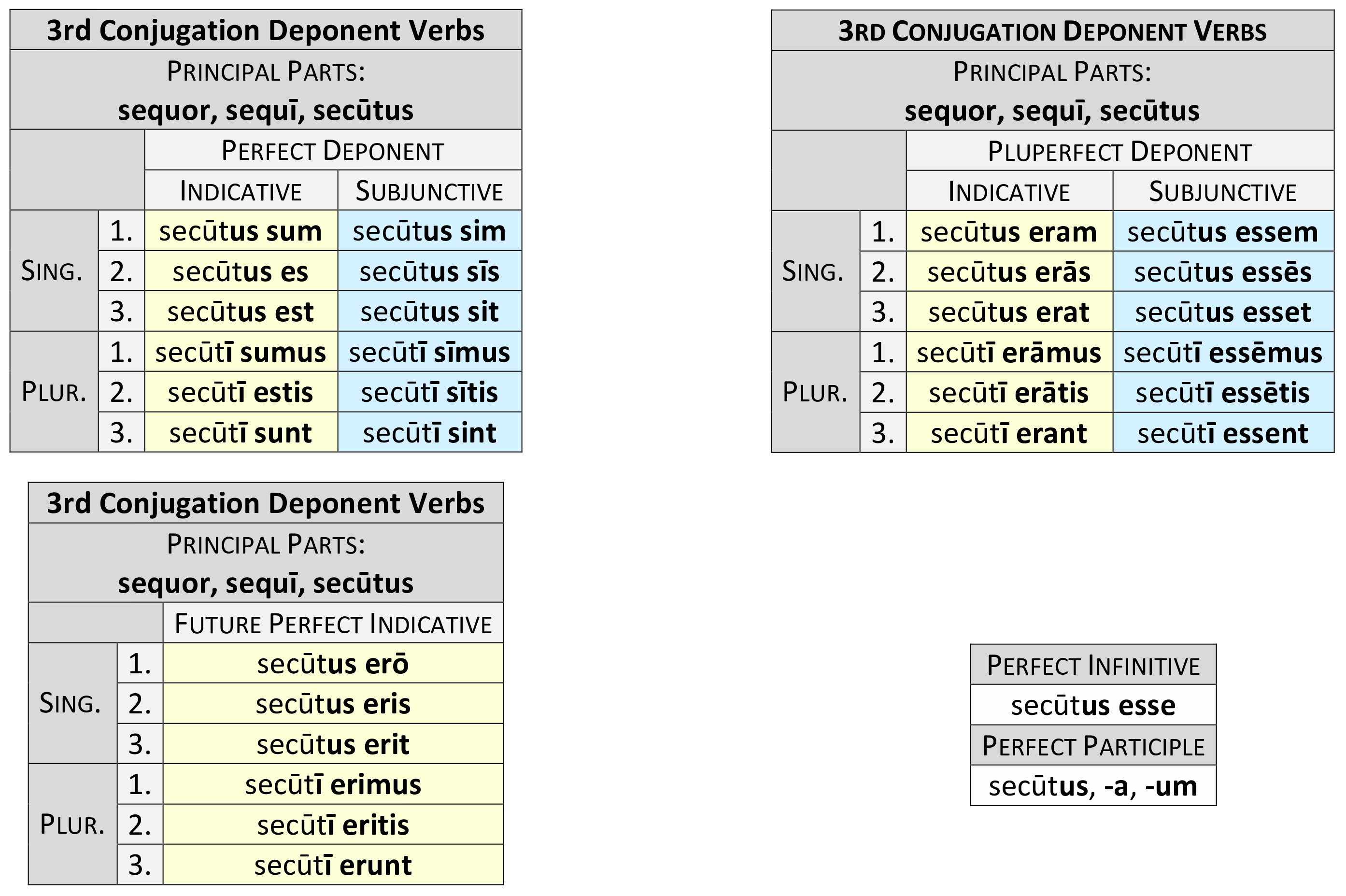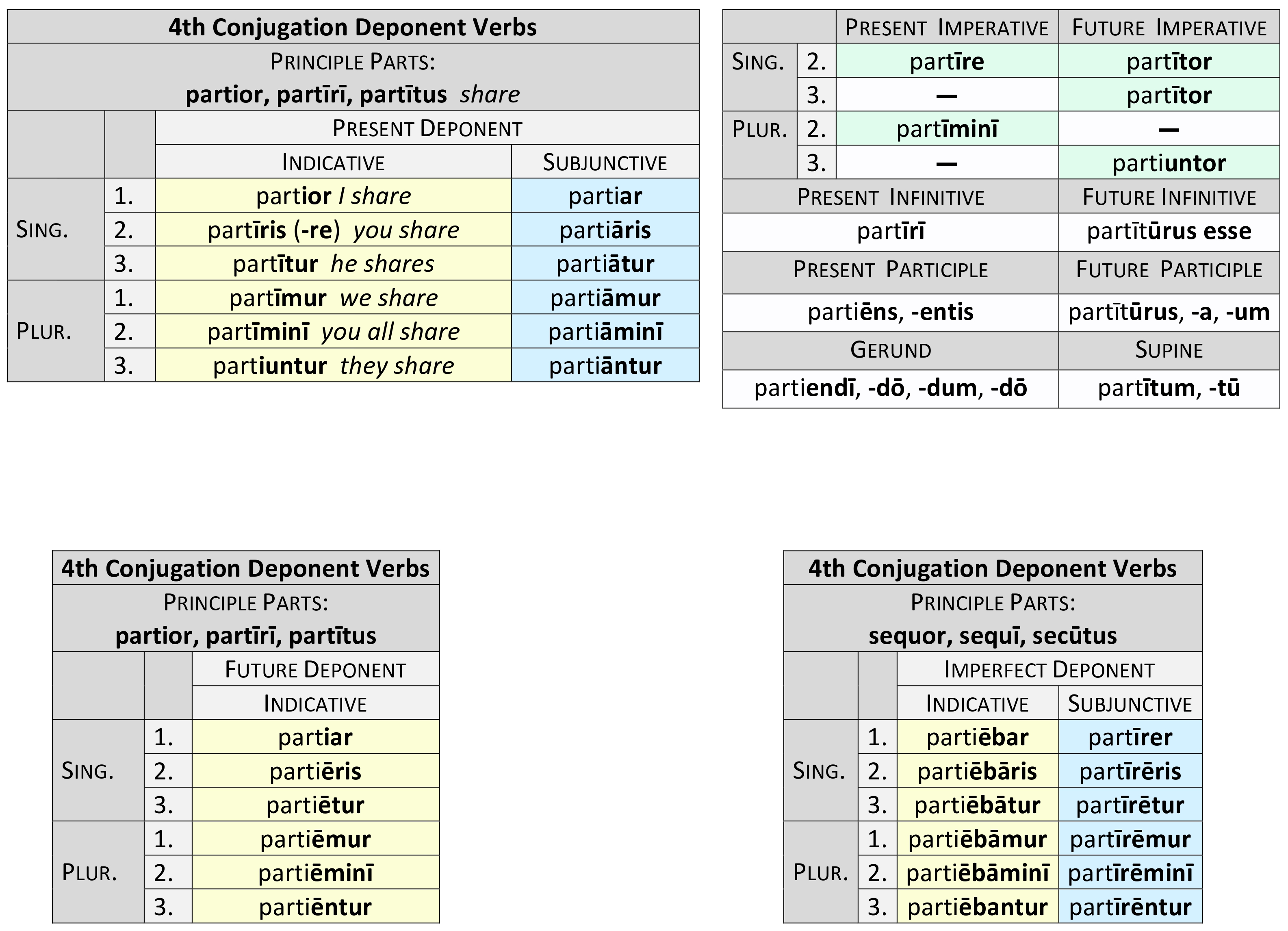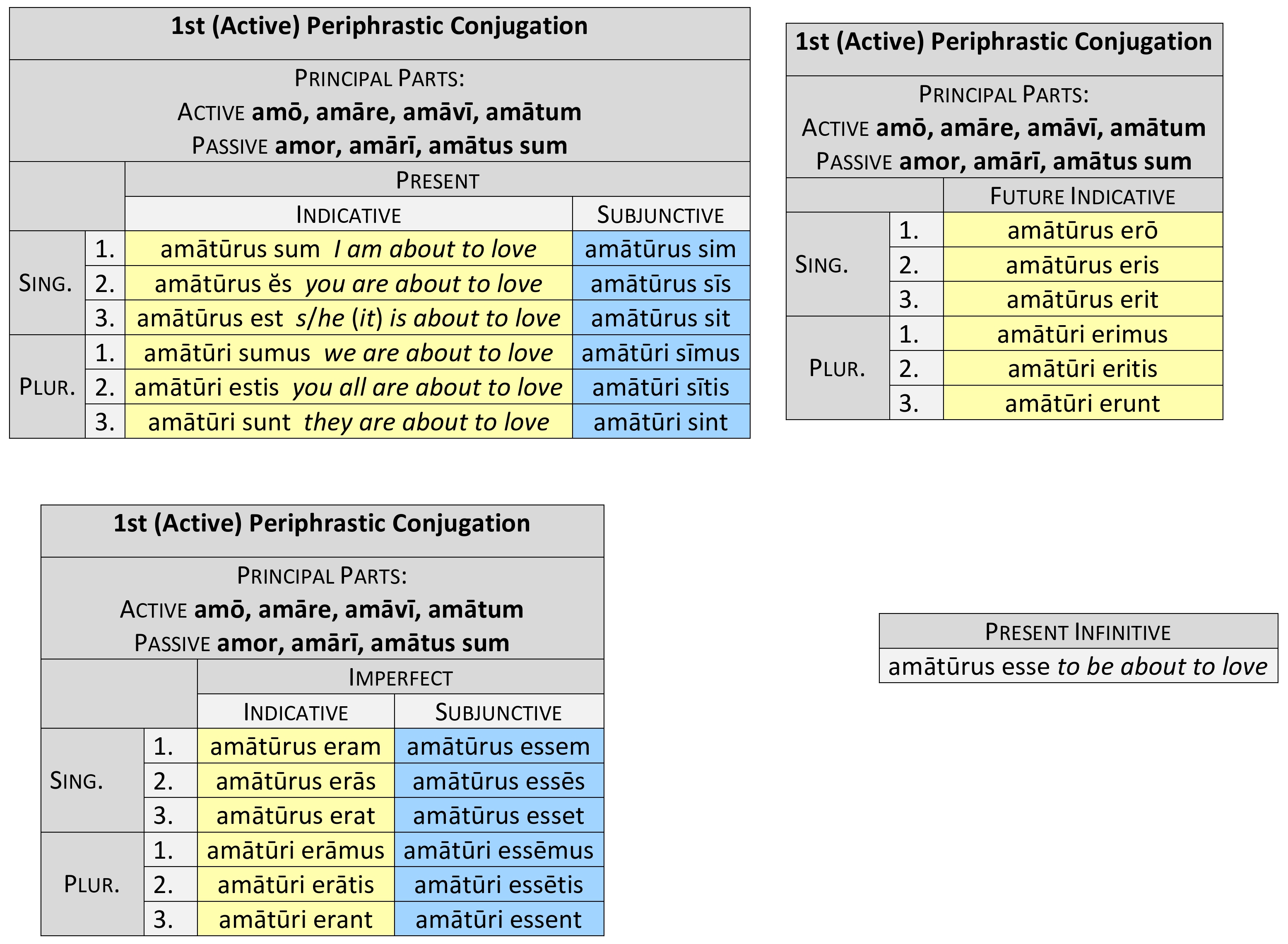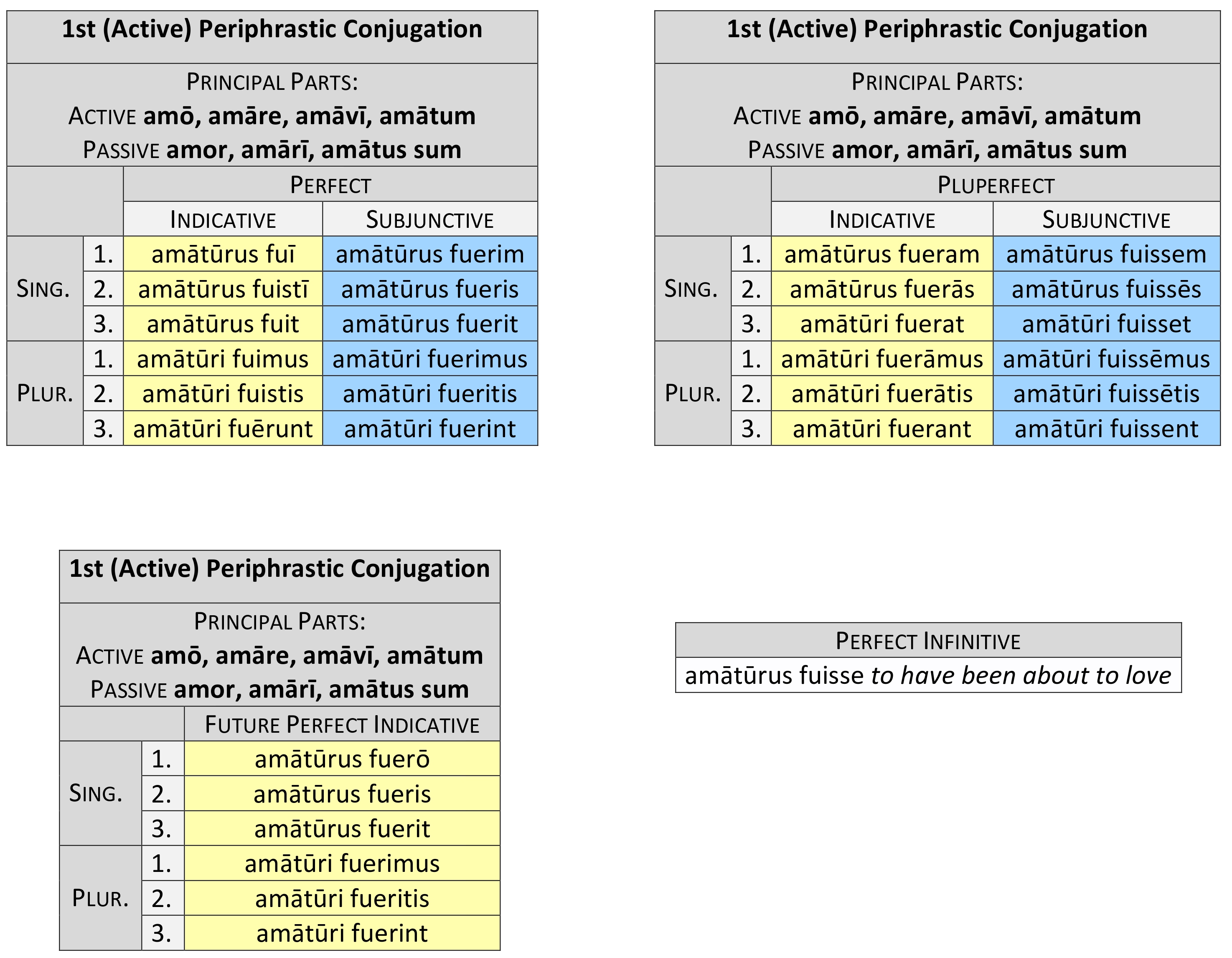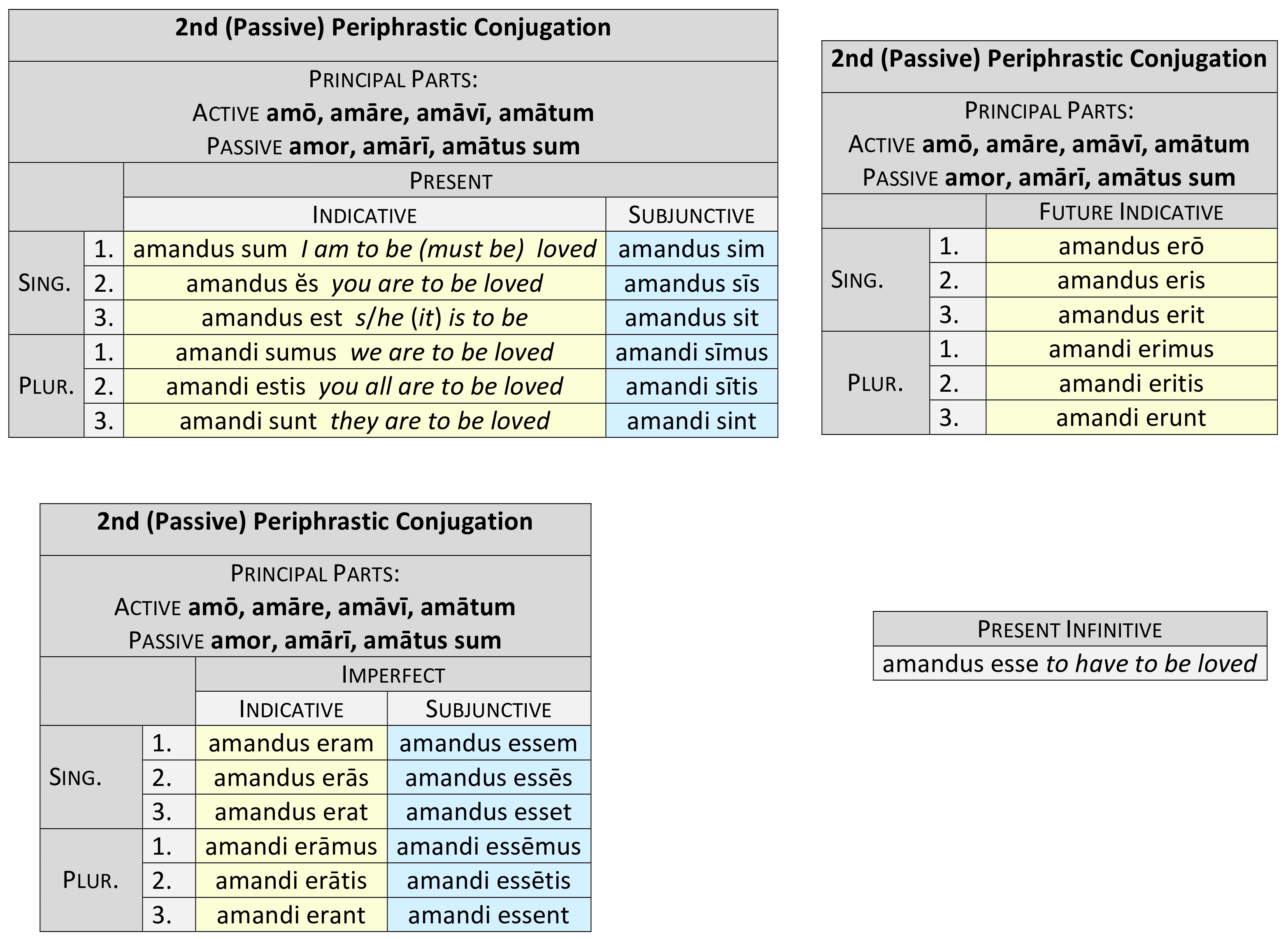CONJUGATIONS
DEPONENT VERBS
190. Deponent Verbs have the forms of the passive voice, with an active or reflexive signification.
a. Deponents have the participles of both voices.
sequēns following, secūtūrus about to follow
secūtus having followed, sequendus to be followed
b. The Perfect Participle generally has an active sense, but in verbs otherwise deponent it is often passive.
mercātus bought
adeptus gained (or having gained)
c. The Future Infinitive is always in the active form, thus sequor has secūtūrus (-a, -um) esse (not secūtum īrī).
d. The Gerundive, being passive in meaning, is found only in transitive verbs, or intransitive verbs used impersonally.
hōc cōnfitendum est This must be acknowledged.
moriendum est omnibus All must die.
e. Most deponents are intransitive or reflexive in meaning, corresponding to what in Greek is called the Middle Voice (§ 156.a Note).
f. Some deponents are occasionally used in a passive sense.
crīminor I accuse or I am accused
g. About twenty verbs have an active meaning in both active and passive forms.
mereō or mereor I deserve
191. More than half of all deponents are of the 1st Conjugation, and all of these are regular. The following deponents are irregular.
| adsentior, -īrī, adsēnsus assent | nītor, ī, nīsus (nīxus) strive |
| apīscor, (-ip-), -ī, aptus (-eptus) get |
oblīvīscor, -ī, oblītus forget |
| dēfetīscor, -ī, -fessus faint | opperior, -īrī, oppertus await |
| expergīscor, -ī, -perrēctus rouse |
ōrdior, -īrī, ōrsus begin |
| experior, -īrī, expertus try | orior, -īrī, ortus (oritūrus) rise (3rd conj. in most forms) |
| fateor, -ērī, fassus confess | pacīscor, -ī, pactus bargain |
| fruor, -ī, frūctus (fruitus) enjoy |
patior (-petior), -ī, passus (-pessus) suffer |
| fungor, -ī, fūnctus fulfill | -plector, -ī, -plexus clasp |
| gradior (-gredior), -ī, gressus step |
proficīscor, -ī, profectus set out |
| īrāscor, -ī, īrātus be angry | queror, -ī, questus complain |
| lābor, -ī, lāpsus fall | reor, rērī, ratus think |
| loquor, -ī, locūtus speak | revertor, -ī, reversus return |
| mētior, -īrī, mēnsus measure | ringor, -ī, rictus snarl |
| -minīscor, -ī, -mentus think | sequor, -ī, secūtus follow |
| morior, -ī (-īrī), mortuus (moritūrus) die | tueor, -ērī, tuitus (tūtus) defend |
|
nancīscor, -ī, nactus (nānctus) find |
ulcīscor, -ī, ultus avenge |
| nāscor, -ī, nātus be born | ūtor, -ī, ūsus use, employ |
Note— The deponent comperior,
-īrí, compertus, is rarely found for comperiō,
-īre. Revertor, until the time
of Augustus, had regularly the active forms in the Perfect system revertī, reverteram,
etc.
a. The following deponents have no supine stem.
| dēvertor, -tī turn aside (to lodge) | medeor, -ērī heal |
| diffiteor, -ērī deny | reminīscor, -ī call to mind |
| fatīscor, -ī gape | vescor, -ī feed upon |
| līquor, -ī melt (intransitive). |
Note— Deponents are really passive (or middle) verbs whose active voice has disappeared. There is hardly one that does not show signs of having been used in the active at some period of the language.
192. A few verbs having no Perfect stem are regular in the Present, but appear in the tenses of completed action as deponents. These are called Semi-deponents. They are:
| audeō, audēre, ausus dare | gaudeō, gaudēre, gāvīsus rejoice |
| fīdō, fīdĕre, fīsus trust | soleō, solēre, solitus be wont |
a. From audeō there is an old Perfect Subjunctive ausim. The form sōdēs for sī audēs (if you will), is frequent in the dramatists and rare elsewhere.
b. The active forms vāpulō, vāpulāre (be flogged) and vēneō, vēnīre (be sold)—contracted from vēnum īre (go to sale)—have a passive meaning, and are sometimes called neutral passives. To these may be added fierī, to be made (§ 204), and exsulāre (to be banished, live in exile); cf. accēdere, (to be added).
Note— The following verbs are sometimes found as semi-deponents:
iūrō, iūrāre, iūrātus, swear
nūbō, nūbere, nūpta, marry
placeō, placēre, placitus
please
PERIPHRASTIC CONJUGATIONS
193. A Periphrastic form, as the name indicates, is a “roundabout way of speaking.” In the widest sense, all verb phrases consisting of participles and sum are periphrastic forms. The Present Participle is, however, rarely used so, and the Perfect Participle with sum is included in the regular conjugation (amātus sum, eram, etc.). Hence the term Periphrastic Conjugation is usually restricted to verb phrases consisting of the Future Active Participle or the Gerundive with sum.
Note— The Future Passive Infinitive, as amātum īrī, formed from the passive infinitive of eō, go, used impersonally with the supine in -um, may also be classed as a periphrastic form (§ 203.a).
194. There are two Periphrastic Conjugations, known respectively as the 1st (or Active) and the 2nd (or Passive).
a. The 1st Periphrastic Conjugation combines the Future Active Participle with the forms of sum, and denotes a future or intended action.
b. The 2nd Periphrastic Conjugation combines the Gerundive with the forms of sum, and denotes obligation, necessity, or propriety.
c. The periphrastic forms are inflected regularly throughout the Indicative and Subjunctive and in the Present and Perfect Infinitive.
195. The 1st (Active) Periphrastic Conjugation
So in the other conjugations—
2nd: monitūrus sum I am about to advise
3rd: tēctūrus sum I am about to cover
4th: audītūrus
sum I am about to hear
3rd -iō: captūrus sum I am about to take
196. The 2nd (Passive) Periphrastic Conjugation
So in the other conjugations—
2nd: monendus sum I am to be (must be) advised
3rd: tegendus sum I am to be (must be)
covered
4th: audiendus sum I am to be (must be) heard
3rd -io: capiendus sum I am to be (must be) taken
